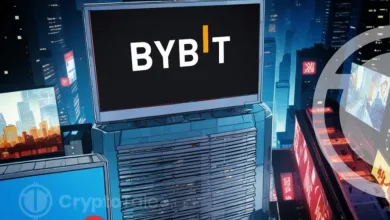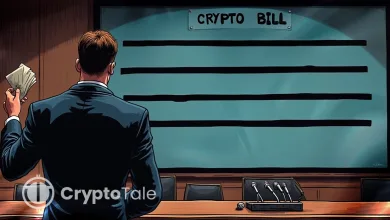The Blockchain Bulletin, Apr 4: Trump’s Tariffs Spark Market Shifts

Hey Folks! Welcome to the latest edition of the Blockchain Bulletin, where we provide significant developments that garnered attention over the last 24 hours. President Donald Trump declared a national emergency and imposed a 10% blanket tariff on all countries from April 5. The impact was felt highly by China, which faces a 34% tariff, while the European Union and Japan are slammed with 20% and 24% tariffs, respectively. Trump’s justification for the tariffs stems from the assertion that the U.S. is charged far less than other countries in trade.
However, a sense of relief emerged when Senator Rand Paul’s efforts led to a rare bipartisan victory in the Senate to block tariffs on Canadian imports. This move provided a brief rebound for global markets, including the digital asset sector.
Elon Musk, however, continues to be a key disruptor in the technological and governmental spaces. His brain-computer interface company, Neuralink, has expanded its search for volunteers to test its brain chip technology, capable of restoring patients paralyzed by a quadriplegic to independence. Neuralink’s implantable and wireless brain-chip technology allows people to operate devices using only their thoughts and free from any physical activity.
Related: SMBG Teams with Ava Labs and Fireblocks for Stablecoin Launch
On the political side, Musk’s Department of Government Efficiency (DOGE) uncovered $32 billion in wasteful government spending and $400 million in inflated leases. The revelations point to the inefficiency in government spending, and Musk’s efforts to eliminate these wastes are expected to bolster market confidence, including in the cryptocurrency space, as funds are redirected back into the economy.
Russia is also making headlines with its approach to cryptocurrency. The country has introduced a legal pathway to sell seized Bitcoin, turning it into state revenue. This move follows the confiscation of 1,032 BTC in a high-profile bribery case, and Dmitry Aristov, head of Russia’s Federal Bailiff Service (FSSP), has stated that Bitcoin is now viewed as a “problematic asset.” The FSSP is now working to sell these seized assets and channel the proceeds into the country’s treasury.
PayPal has now added Solana and Chainlink to its list of supported cryptocurrencies. The development is a reflection of PayPal’s continued push towards integrating blockchain technology into traditional finance offerings. The company now allows U.S. consumers to buy, sell, and hold Solana and Chainlink alongside assets such as Bitcoin, Ethereum, Litecoin, and Bitcoin Cash.
After being imposed with a 36% tariff by President Trump, Thailand has proposed to talk with the US to reduce the tariffs and protect exporters’ interests. The country’s Prime Minister, Paetongtarn Shinawatra, assured citizens that she will speak directly with the American authorities to negotiate a better deal so that the country’s economy does not suffer further damage.
Related: CZ Donates 500 BNB as Binance Airdrops $1.5M in Earthquake Aid
Hbar Foundation joins OnlyFans founder to seize control of TikTok’s US operations. The development comes at a time amid concerns over national security. Further, Amazon has also filed a last-minute request for the acquisition of the app. With the April 5 deadline for TikTok to meet demands imposed by the US national security, the outcome of this bid could greatly influence the future of TikTok in the country.
Meanwhile, North Korea’s Lazarus Group continues its involvement in crypto, making headlines with a $2.51 million profit from selling 40.78 Wrapped Bitcoin, which it had acquired two years ago. The group’s continued engagement in the crypto space highlights the intersection of illicit activities and digital assets, further complicating the global narrative surrounding cryptocurrencies.
As global politics, technology, and finance continue to intersect, their impact on digital assets becomes increasingly profound. From tariff tensions to crypto adoption and regulatory shifts, each development shapes a rapidly evolving landscape. Stakeholders must remain vigilant as innovation and geopolitical moves redefine the future of global markets and cryptocurrencies.




